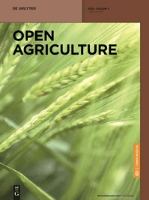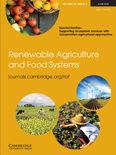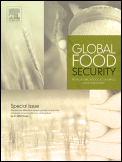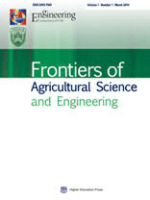
Frontiers in Sustainable Food Systems
Scope & Guideline
Pioneering research to nourish our planet sustainably.
Introduction
Aims and Scopes
- Sustainable Agricultural Practices:
Research on methods and technologies that promote environmentally friendly farming practices, such as agroecology, permaculture, and conservation agriculture. - Food Security and Nutrition:
Studies that assess and enhance food security, dietary diversity, and nutritional outcomes in various populations, particularly in low- and middle-income countries. - Climate Change Adaptation and Mitigation:
Exploration of strategies for adapting agricultural systems to the impacts of climate change, as well as efforts to reduce greenhouse gas emissions from food systems. - Socioeconomic Impacts of Food Systems:
Analysis of the social and economic factors influencing food production, consumption, and equity, including gender roles and rural livelihoods. - Innovative Food Technologies:
Research on new technologies and practices in food processing, preservation, and packaging that enhance sustainability and food quality. - Waste Reduction and Circular Economy:
Studies focusing on strategies for minimizing food waste and promoting circular economy principles within food systems. - Biodiversity and Ecosystem Services:
Investigations into the role of biodiversity in agriculture and its contribution to ecosystem services that support sustainable food production.
Trending and Emerging
- Digital Agriculture and Technology:
An increasing focus on the integration of digital tools and technologies in agriculture, including precision farming, data analytics, and remote sensing to improve productivity and sustainability. - Plant-Based and Alternative Proteins:
Growing interest in plant-based diets and alternative proteins, including cultured meat and insect protein, as sustainable solutions to food security and environmental concerns. - Agroecological Approaches:
A shift towards research that emphasizes agroecology and regenerative farming practices, which promote biodiversity, soil health, and ecosystem resilience. - Food Policy and Governance:
Emerging studies on food governance, policy frameworks, and their role in enhancing food system sustainability, equity, and resilience. - Community-Based Food Systems:
Increased attention to local and community-based food systems that support food sovereignty, resilience, and sustainable livelihoods. - Climate Resilience in Agriculture:
A trending focus on developing agricultural practices that enhance resilience to climate change impacts, including drought and extreme weather events. - Waste Valorization:
Innovative approaches to food waste management and valorization, exploring how waste can be transformed into valuable resources for agriculture and food production.
Declining or Waning
- Conventional Agricultural Practices:
Research focusing on conventional farming methods is declining as the journal increasingly emphasizes sustainable and regenerative practices. - Single Crop Systems:
Studies centered around monoculture practices are becoming less common, reflecting a broader recognition of the benefits of crop diversification. - Food Production as a Sole Focus:
The emphasis on production alone without consideration of environmental and social impacts is decreasing, as integrated approaches gain traction. - Traditional Food Systems without Innovation:
Research on traditional food systems that do not incorporate innovative practices or technologies is losing ground to studies that advocate for modernization and sustainability.
Similar Journals

Future Foods
Connecting innovation with food production.Welcome to Future Foods, a cutting-edge academic journal published by Elsevier, dedicated to advancing the field of food science. As a prestigious Q1 journal in the Food Science category, it ranks impressively as #43 out of 389 in Scopus, placing it in the 89th percentile among its peers. Future Foods aims to explore innovative developments in sustainable food systems, novel food products, and the intersection of technology and food production, thus providing a platform for research that addresses global challenges such as food security and nutrition. With its focus on future-oriented solutions and trends in the food industry, this journal is essential for researchers, professionals, and students who are eager to contribute to the discourse around cutting-edge food science. Situated in the Netherlands, the journal serves the international academic community and fosters collaboration and knowledge sharing in the realm of food innovation.

Asian Journal of Agriculture and Development
Transforming agricultural practices through rigorous scholarship.Asian Journal of Agriculture and Development is a prestigious academic journal dedicated to advancing the field of agricultural research and development within the context of Southeast Asia. Published by the Southeast Asian Regional Center for Graduate Study and Research in Agriculture, this journal plays a vital role in disseminating innovative findings and best practices critical for sustainable agricultural development in the region. With a focus on interdisciplinary studies that integrate agricultural science, policy development, and socio-economic factors, the journal invites researchers, professionals, and students to contribute rigorous research that addresses contemporary challenges faced by the agriculture sector. Although it operates within a non-open access framework, the journal aims to ensure wide visibility and accessibility of its publications through strategic collaborations and institutional partnerships. By engaging with its content, stakeholders can gain valuable insights and foster meaningful dialogue that drives forward agricultural progress in Asia.

Open Agriculture
Empowering Research for Global Food SecurityOpen Agriculture, published by DE GRUYTER POLAND SP Z O O, is an innovative open-access journal dedicated to advancing research in the Agricultural and Biological Sciences. Since its inception in 2016, this journal has been committed to disseminating knowledge and facilitating collaboration among researchers, professionals, and enthusiasts in the agricultural sector. With an impressive Q2 ranking in the Agricultural and Biological Sciences category, it holds a prestigious position, ranking #65 out of 221 in its field, placing it in the 70th percentile. Open Agriculture offers a platform for high-quality research across a diverse range of topics, ensuring that crucial findings are readily accessible to the global scientific community. The journal continues to uphold its mission of promoting sustainable agricultural practices and innovations that address contemporary challenges in food security and environmental sustainability. With its strong commitment to open access principles, researchers and students alike can easily engage with cutting-edge research and contribute to the vibrant discourse surrounding modern agriculture.

Agricultural and Food Economics
Advancing research at the intersection of agriculture and economics.Agricultural and Food Economics is a leading journal published by SPRINGERNATURE, dedicated to the advancement of research in the interconnected fields of agriculture, food systems, and economic analysis. Established in 2013 and operating under an Open Access model, this journal serves as a vital platform for scholars and practitioners to disseminate innovative findings and insights that influence policy and practice. With a notable impact reflected in its 2023 quartile rankings—Q1 in Agricultural and Biological Sciences (miscellaneous), Q2 in Economics and Econometrics, and Q1 in Food Science—this journal is recognized for its rigorous scholarly output. It ranks among the top resources in its domain, with Scopus ranks placing it in the 88th percentile for Agricultural and Biological Sciences and the 79th percentile for Economics. The journal covers a broad spectrum of topics, including sustainable agricultural practices, the dynamics of food markets, and the economic implications of food policies. Researchers, professionals, and students alike will find valuable insights and comprehensive analyses that contribute to the ever-evolving discourse on food and agriculture.

RENEWABLE AGRICULTURE AND FOOD SYSTEMS
Exploring the nexus of agriculture, sustainability, and innovation.RENEWABLE AGRICULTURE AND FOOD SYSTEMS, published by Cambridge University Press, is a leading open-access journal dedicated to the advancement of sustainability in agricultural practices and food systems. With an ISSN of 1742-1705 and an E-ISSN of 1742-1713, this journal spans the interdisciplinary fields of agronomy and food science, achieving a commendable Q2 ranking in both categories for 2023. As it continues to converge through the years from 2004 to 2024, the journal offers a platform for researchers, professionals, and students to disseminate transformative research that addresses the challenges of food security, resource management, and environmental impact. The journal’s significant impact is underscored by its Scopus rankings, situating it in the 77th percentile among agronomy and crop science publications, and the 67th percentile in food science. Since becoming fully open access in 2023, RENEWABLE AGRICULTURE AND FOOD SYSTEMS promotes wider accessibility to vital research findings, fostering collaboration and innovation in the pursuit of sustainable agricultural practices and food systems worldwide.

Global Food Security-Agriculture Policy Economics and Environment
Uniting disciplines to safeguard our global food systems.Global Food Security - Agriculture Policy Economics and Environment is a leading interdisciplinary journal published by Elsevier that addresses critical issues in food security through the lens of agriculture, economics, and environmental sustainability. With an impressive impact factor and a distinguished placement in the Q1 quartile across multiple categories including Ecology, Food Science, and Safety Research for 2023, this journal is a vital resource for researchers and practitioners aiming to address modern challenges in global food systems. Covering essential topics from agricultural policy to ecological implications, the journal provides a platform for innovative research and policy discussions that foster the advancement of food security on a global scale. Notably, it is indexed in Scopus, where it ranks in the top percentiles across its relevant categories, reflecting its significance in the field. The journal is accessible to a wide audience, making it an indispensable source of knowledge for professionals and students aiming to tackle the complex interplay between food production and environmental stewardship.

AGRICULTURAL SYSTEMS
Pioneering research at the intersection of agronomy and animal science.AGRICULTURAL SYSTEMS, published by Elsevier Science Ltd, is a premier academic journal that serves as a leading platform for innovative research in the fields of agronomy, animal science, and related biological sciences. With a prestigious impact factor reflected in its Q1 ranking in both Agronomy and Crop Science, as well as Animal Science and Zoology, the journal showcases cutting-edge studies and developments from 1976 through 2024. Located in the United Kingdom, the journal features a robust selection of articles that emphasize the integration of agricultural systems, enhancing global agricultural productivity and sustainability. Although it does not currently offer open access options, AGRICULTURAL SYSTEMS maintains an excellent reputation amongst scholars, epitomized by its high rankings in Scopus, placing it in the top 1% of journals in its categories. This makes it an essential resource for researchers, professionals, and students dedicated to advancing knowledge and practice within the agricultural sector.

Frontiers of Agricultural Science and Engineering
Championing open-access knowledge in agricultural science.Frontiers of Agricultural Science and Engineering, published by HIGHER EDUCATION PRESS, is a distinguished open-access journal established in 2014, dedicated to advancing research across the fields of agricultural and biological sciences, biotechnology, and veterinary studies. With an impressive Q1 ranking in both Agricultural and Biological Sciences and Veterinary categories for 2023, this journal positions itself prominently within the academic landscape, reflecting the importance and quality of the research it disseminates. The journal serves as a vital platform for researchers, professionals, and students worldwide, featuring a broad array of studies that enhance our understanding of agricultural technologies, biotechnological innovations, and veterinary sciences. With a focus on rigor and accessibility, Frontiers of Agricultural Science and Engineering promotes the global exchange of knowledge, encouraging the collaboration that is essential for tackling contemporary challenges in these critical fields. Available online with a comprehensive range of article options, it continues to contribute to the scientific community's advancements in agricultural and biological disciplines.

ITALIAN JOURNAL OF FOOD SCIENCE
Elevating Global Knowledge in Food ScienceITALIAN JOURNAL OF FOOD SCIENCE is a distinguished open-access publication dedicated to advancing knowledge in the field of food science, catering to a global audience of researchers, professionals, and students. Published by Codon Publications in Singapore, this journal, operating under the ISSN 1120-1770 and E-ISSN 2239-5687, has been a vital platform for scholarly discourse since its inception in 1996, converging towards a comprehensive view of food science trends through 2024. With an impressive ranking in the third quartile (Q3) of the Food Science category and a Scopus rank of #151 out of 389, the journal plays a significant role in disseminating high-quality research, contributing to a richer understanding of food science within the agricultural and biological sciences. Since transitioning to open access in 2008, it has further expanded its reach, ensuring that innovative research is accessible to all, thereby fostering collaboration and knowledge exchange in this vital industry.

Nature Food
Fostering Collaboration in Food and Agricultural Research.Nature Food, an esteemed journal published by NATURE PORTFOLIO, stands at the forefront of research in Agronomy, Animal Science, and Food Science. With its E-ISSN 2662-1355 and a remarkable recognition of being ranked Q1 in three essential categories by Scopus in 2023, it is tailored for researchers, professionals, and students dedicated to the advancement of knowledge in these fields. Situated in the United Kingdom and extending its reach globally, the journal has displayed an impressive ranking, placing it in the top percentiles of Agricultural and Biological Sciences, highlighting its vital place in fostering innovative research and scholarly communication. The journal's scope encompasses a wide array of topics critical to food systems, sustainability, and agricultural practices, making it an invaluable resource for anyone looking to stay ahead in this dynamic area of study. With access options designed to enhance the visibility and dissemination of research findings, Nature Food is committed to promoting open dialogue and collaboration among the global academic community, driving forward our understanding of food security and environmental stewardship.